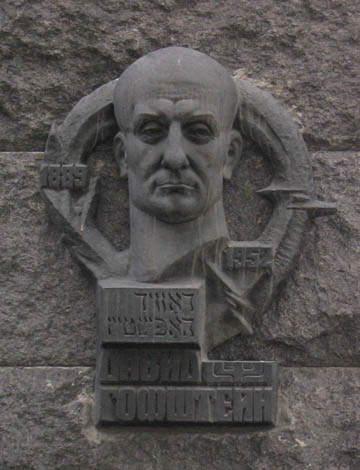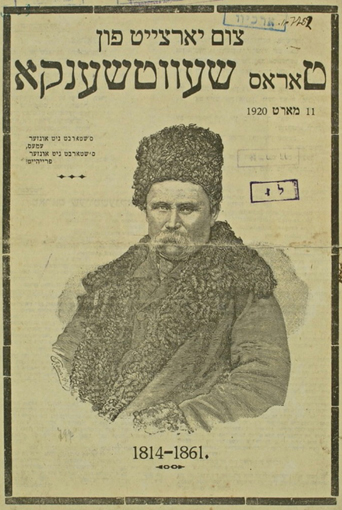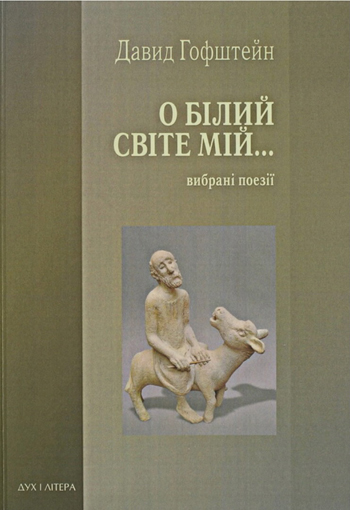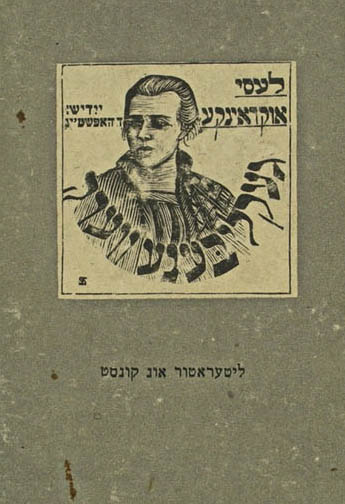Hofstein, David
Hofstein, David or Dovid Hofshteyn [Гофштейн, Давид], b 24 June 1889 in Korostyshiv, Kyiv gubernia, d 12 August 1952 in Moscow. Yiddish poet, writer, dramatist, and translator. Growing up in the village of Yasnohorod in Volhynia, Hofstein obtained his early education at a religious school, and later under his grandfather who was also an elementary school teacher in Korostyshiv. At the age of seventeen, he began working as a teacher in a neighboring village. In 1907 he moved to Kyiv, where he completed secondary education as an external student. After his military service (1912 to 1913), he returned to Kyiv and enrolled in the Kyiv Commercial Institute and also attended lectures in the philology faculty of Kyiv University. Hofstein began to write poetry in Hebrew at the age of nine. Later, under the pseudonym D. Naumov, he expanded his poetic repertoire to include Russian, Ukrainian, and Yiddish. He made his Yiddish debut in print in 1917 in the Kyiv newspaper Naye tsayt. He soon became a prominent figure in Jewish literary life of the city and assumed multiple roles, including an administrator of Kultur Lige and lecturer in the Lige’s literature and drama studios, and editor of various poetry editions. His creative works were showcased in anthologies such as Eygns (One’s Own, 1918–20), Oyfgang (Afresh, 1919), and Baginen (Dawn, 1919). Between 1919 and 1922 he also published six of his own poetry collections, the first of which was Bay vegn (At the Road). Together with the poets Leib Kvitko and Perets Markish he made up the so-called Kyiv lyric triad of Yiddish poets (or Kyiv Group). Additionally, he played a pivotal role in the establishment and management of the publishing house Vidervuks (Renewal), which focused on publishing pedagogical collections to nurture young Yiddish poets. Hofstein was also involved in the field of children's literature and served as the editor for the children’s magazines Shretelekh and Kling-klang.
In late 1920, he relocated to Moscow, where he was invited to join the leadership of the Moscow circle (later evolving into a union) of Jewish writers and artists. He became one of the editors of the monthly Shtrom, solidifying his position as a key figure in the Jewish literary and artistic scene. However, in 1923 Hofstein had a rift with the with the Communist Jewish Section after he signed a memorandum protesting the persecutions targeting Hebrew-language writers. Following this conflict, he left the Soviet Union and settled for a brief time in Berlin. During his stay there, he published poetry in the New York journal Di tsukunft, including longer dramatic poems ‘Shoyl, der letste meylekh fun Yisroel’ (Saul, the Last King of Israel, 1924) and “Meshiekhs tsaytn” (Messianic Times, 1925), released a poetry collection In tovl fun vent (On the Tableau on the Walls), and composed five plays, only three of which were published. Finding the atmosphere of Berlin unsuitable for his work, he relocated in April 1925 to Palestine, where he published Hebrew poetry in Jewish publications.
In 1926 Hofstein returned to Kyiv and played a vital role in advocating for the participation of Jewish revolutionary writers in the All-Ukrainian Association of Proletarian Writers (VUSPP) and for the establishment of a Jewish section within it. In 1927 the first conference of Jewish Proletarian Writers of Ukraine took place, where he was elected as a leader of VUSPP’s Jewish section. In March 1928 he joining the editorial board of their monthly organ Prolit. However, in October 1929 a conflict within the Jewish section of VUSPP led to his expulsion.
In the subsequent years, Hofstein continued to make notable contributions to Yiddish language and literature. His publications included readers focused on Yiddish language and literature, a book Teorye fun literatur, poetic (Theory of Literature, Poetics), and children’s drama Spartak (Spartacus). A chapter from his autobiographical novel Yorn (Years) was published in the Kyiv journal Farmest. As translator of drama, he translated William Shakespeare’s Merchant of Venice (as Der soykher fun Venedik) for the Kyiv Yiddish State Theater and Henrik Ibsen’s Nora for the Odesa Yiddish State Theater. Hofstein was also a prolific translator of works from Russian, Ukrainian, and German, with a particular focus on the poetry of Taras Shevchenko, Lesia Ukrainka, and Ivan Franko. In March 1920 Ber Orshansky published a Yiddish-language brochure Tsum yortsayt fun Taras Shevchenko (On the Anniversary of Taras Shevchenko’s Death), which included, among others, Hofstein’s article and his translation of Shevchenko’s ‘Testament.’ A book of Hofstain’s Yiddish-language translations of the selected works of Lesia Ukrainka was published in Kyiv in 1931, while his translations of Ivan Franko’s selected works were published in 1936. He also co-edited an anthology of Yiddish literature in Ukrainian.
During the Second World War, Hofstein played a prominent role in the activities of the Jewish Anti-Fascist Committee. From July 1941 until August 1944 he was in evacuation in Ufa where he contributed poems to the newspaper Eynikeyt and various other periodicals. Upon his return to Kyiv in 1946 he was awarded by the Soviet government with a medal ‘for heroism’ during wartime. During this period, he wrote a play Muter (Mother). In 1948 the Moscow publisher Der Emes released a volume of his Oysgeveylte verk (Selected Works). On 16 September 1948, during the Stalinist purges of Jewish culture, Hofstein was arrested in connection with the so-called ‘affair of the Jewish Anti-Fascist Committee,’ imprisoned, and subjected to torture. On August 12, 1952, together with thirteen other individuals, he was executed in the Lubianka Prison in Moscow during what is sometimes referred to as ‘the Night of the Murdered Poets.’ He was posthumously ‘rehabilitated.’
Hofstein’s poetry was translated into Ukrainian by Pavlo Tychyna, Maksym Rylsky, Volodymyr Sosiura, Hryhorii Kochur, Mykola Lukash, Lina Kostenko, Leonid Pervomaisky, Naum Tykhy, Valeriia Bohuslavska, and others. Reportedly, Pavlo Tychyna learned Yiddish especially to translate the works of David Hofstein, Osher Schwartzman, and Leib Kvitko. Hofstein’s translated works into Ukrainian include collections such as Vybrani poeziï (Selected Poems, Kyiv, 1938; 1939; 1945; 1965) and V nashi hrizni dni (In Our Terrible Days; Ufa, 1942). In 2012 an almost complete collection of translations of Hofstein’s poetic legacy into Ukrainian was published in Kyiv by Dukh i Litera publishing house under the title O bilyi svite mii (O Light World of Mine).
BIBLIOGRAPHY
Kagan, Berl, comp., Leksikon fun yidish-shraybers (New York 1986)
Sandler, Boris; Estraikh,Gennady (eds.) Leksikon fun yidishe shrayber in ratn-farband (New York 2011)
Glaser, Amelia M. ‘Jewish Alienation through a Ukrainian Looking Glass: Dovid Hofshteyn’s Translations of Taras Shevchenko,’ Prooftexts 36, no. 1–2 (2017)
Batanova, Tetiana. ‘Pereklady ukraïns'koï ta ievreys'koï ïdishomovnoï literatury u vydannyakh 1920–1930 rokiv iz fondiv Natsional'noï biblioteky Ukraïny imeni V. I. Vernadskoho,’ Mizhnarodna naukova konferentsiia: Biblioteka. Nauka. Komunikatsiia. Innovatsiini transformatsiï resursiv i posluh (Kyiv 2022)
Larysa Bilous
[This article was written in 2023.]




